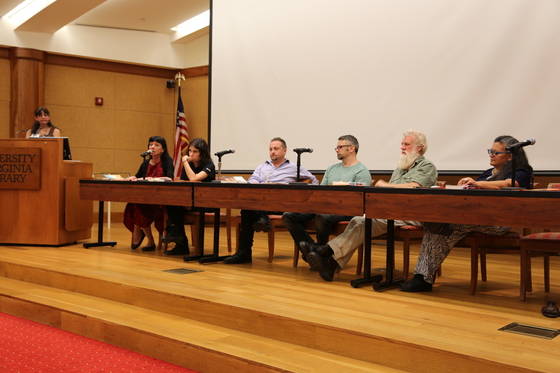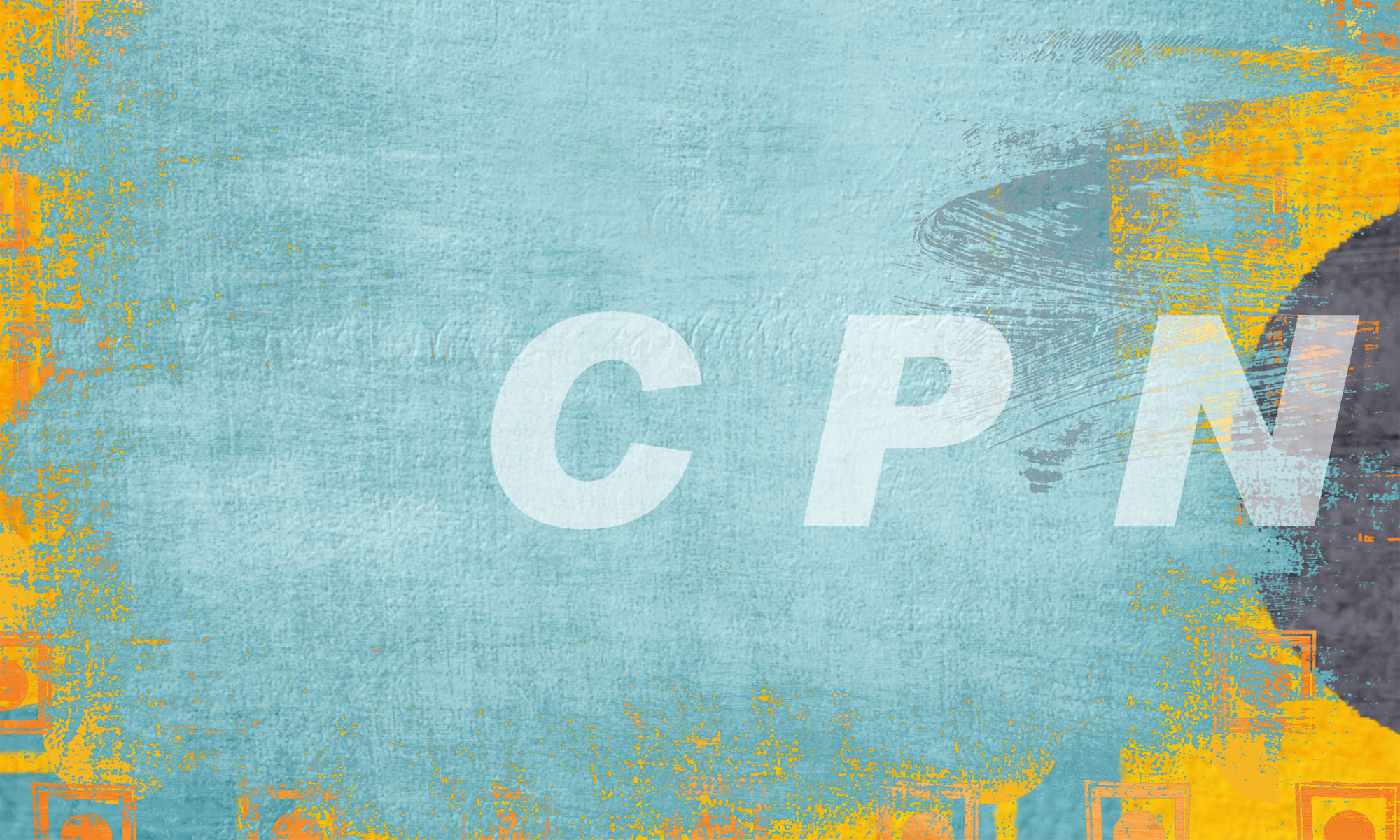Six Indigenous Australian writers and two Indigenous American writers read from and discussed their work in an event titled First People: Indigenous Writers from Australia and North America on September 8, 2015 at the Harrison Institute Auditorium.
Each writer spent seven minutes reading from a work of their choice. Karenne Wood (Monacan) led a discussion about Indigenous identity and writing. Questions were also taken from the audience. The speakers were introduced by Kluge-Ruhe director Margo Smith.

The program was intended to inspire writers at U.Va. and in the community by introducing them to emerging and established Indigenous authors, while also creating a visible platform for Indigenous voices to be shared and heard in our community, where these voices are often considered invisible and are sometimes intentionally silenced. “As always, we are excited to provide the opportunity for public dialogue about the politics of Indigenous identities and how these inform the study of human culture. Usually visual art is the platform for this conversation at Kluge-Ruhe, but we are committed to supporting all kinds of Indigenous creativity, and are grateful for the chance to showcase the compelling and relevant works of these writers ,” said Education and Program Coordinator Lauren Maupin.
Indigenous Australian writers Bruce Pascoe, Jared Thomas, Dub Leffler, Jeanine Leane, Ellen Van Neervan, and Cathy Craigie are members of the First Nations Australian Writers Network, an organization that acts as an advocacy and resources service for Aboriginal and Torres Strait Islander writers and storytellers. Already in the United States for the 2015 National Book Festival in Washington, D.C., the Kluge-Ruhe Aboriginal Art Collection invited them to Charlottesville to participate in the panel reading and discussion.
Kluge-Ruhe reached out to the Mary and David Harrison Institute as a partnering host for this program, as well as Karenne Wood (Monacan) of the Virginia Indian Program at the Virginia Foundation for the Humanities. Wood, being a published poet herself, agreed to participate and moderate the panel. Poet Deborah Miranda (Ohlone-Costanoan Esselen), who has won numerous writing awards and teaches at Washington and Lee, also participated.
“This is an unprecedented opportunity to hear from Indigenous writers on both sides of the globe, to compare our historical and contemporary experiences, and to talk about how we use writing to challenge people’s perceptions,” said Karenne Wood.
The program was sponsored by the Kluge-Ruhe Aboriginal Art Collection of U.Va., the Virginia Foundation for the Humanities, the First Nations Australian Writers Network, the Mary and David Harrison Institute for American History, Literature and Culture and the Australia Council for the Arts.
More information about each writer follows.
Karenne Wood is an enrolled member of the Monacan Indian Nation and serves on the Monacan Tribal Council. She is currently a PhD candidate in anthropology at the University of Virginia, working to reclaim indigenous languages and revitalize cultural practices. She recently edited The Virginia Indian Heritage Trail, published by the Virginia Foundation for the Humanities, led the “Beyond Jamestown” Teachers’ Institute, and curated the “Beyond Jamestown: Virginia Indians Past and Present” exhibition at the Virginia Museum of Natural History. She was previously the Repatriation Director for the Association on American Indian Affairs, coordinating the return of sacred objects to Native communities. She has also worked at the National Museum of the American Indian as a researcher, and she directed a tribal history project with the Monacan Nation for six years. Wood held a gubernatorial appointment as Chair of the Virginia Council on Indians for four years, and she has served on the National Congress of American Indians’ Repatriation Commission.
Bruce Pascoe is of Bunurong, Yuin, Tasmanian heritage. His books include Shark, Ruby-eyed Coucal, Ocean, Earth and Nightjar. His novel, Bloke, was published by Penguin in 2009. The children’s novel, The Chainsaw File, was published by Oxford University Press in 2011. Fog a Dox was published in 2012 by Magabala and won the Prime Minister’s Award for Young Adult Literature in 2013. Dark Emu was published by Magabala in 2014 and was shortlisted in the Western Australia and Queensland Literary Awards. In 2014 he attended the Australian New Zealand Literary Festival in London and in 2015 will visit festivals in Scotland, Mongolia and the USA.
Jared Thomas is a Nukunu man of the Southern Flinders Ranges and an author of young adult fiction. His debut novel Sweet Guy was short listed for three major Australian literature awards and his children’s novel Dallas Davis, the Scientist and the City Kids is published in the Oxford University Press Yarning Strong series. Calypso Summer won the 2013 State Library of Queensland black&write! Fellowship and was included in iTunes best books of April 2014. Leading Indigenous publisher Magabala Books will release Songs that Sound like Blood in 2015.
Dub Leffler is descended from the Bigambul people who survived the fourteen year Bigambul war of the 1840s in Australia. He is an accomplished author and illustrator with over eighteen feature titles to his name and has collaborated with such luminaries as Colin Thompson, Shaun Tan and Banksy. He is Australia’s premiere Indigenous illustrator of children’s literature. Dub’s book, Once There Was a Boy, which he both wrote and illustrated, was one of the biggest children’s books of 2011 in Australia.
Jeanine Leane is a Wiradjuri woman from southwest New South Wales with a Ph.D. in Literature and Aboriginal representation. She currently holds a post-doctoral fellowship at the Australian National University. In 2010, Jeanine’s first volume of poetry, Dark Secrets After Dreaming: AD 1887-1961 won the Scanlon Prize for Indigenous Poetry from the Australian Poets’ Union and her manuscript, Purple Threads won the David Unaipon Award at the Queensland Premier’s Literary Awards. Jeanine is the recipient of an Australian Research Council Discovery grant (2011) for her project Reading the Nation: A critical study of Aboriginal/Settler representation in the contemporary Australian Literary Landscape and a Discovery Indigenous Award (2013) for her new project The David Unaipon Award: Shaping the literary and cultural history of Aboriginal writing in Australia.
Ellen Van Neervan is a Yugambeh woman from South-East Queensland, Australia. She is the author of the award-winning Heat and Light (UQP, 2014). Divided into three sections, it is inspired by the intersection of familial history, location and identity. Ellen has been awarded a Queensland Writers Fellowship to pursue her next project in 2015, a novel about Aboriginal relationships with mega fauna. She lives in Brisbane where she works as the senior editor of the black&write! project at the State Library of Queensland, which aims to support and promote Aboriginal and Torres Strait Islander writers and editors.
Cathy Craigie is a Gamilaroi and Anaiwon woman from northern New South Wales. She has worked in Aboriginal Affairs for over thirty years. She was one of the original founders of Koori Radio/Gadigal Information Service and has worked in senior positions with the Australia Council and the New South Wales Department of Aboriginal Affairs. Cathy has held a variety of key positions in other Aboriginal arts, health and housing organizations at national and international levels. She is also an aspiring writer and has written several plays and stories. Cathy was Festival Curator, Guwanyi (to tell) the National Aboriginal Writers’ Festival held at the New South Wales Writers Centre.
Deborah Miranda is a Ohlone-Costanoan Esselen woman of California. She was born in Los Angeles to an Esselen/Chumash father and a mother of French ancestry. She grew up in Washington State, earning a BS in teaching moderate special-needs children from Wheelock College in 1983 and an MA and PhD in English from the University of Washington. Miranda is a poet and her collections of poetry include Indian Cartography: Poems (1999), winner of the Diane Decorah Memorial First Book Award from the Native Writers’ Circle of the Americas; and The Zen of La Llorona (2005), nominated for a Lambda Literary Award. Miranda also received the 2000 Writer of the Year Award for Poetry from the Wordcraft Circle of Native Writers and Storytellers. Her mixed-genre collection Bad Indians: A Tribal Memoir (2013) won a Gold Medal from the Independent Publisher’s Association and was shortlisted for the William Saroyan Award.
